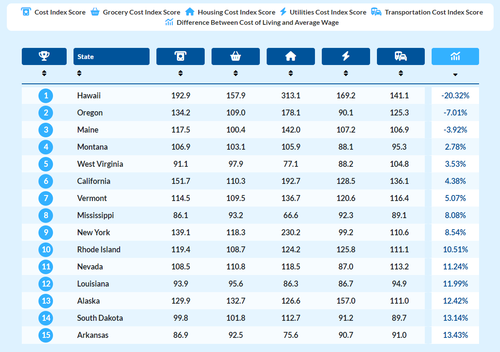New Study Finds Hawaii, Oregon, Among Least Affordable States To Live In
Careers board Lensa produced a new study this week laying out the least and most affordable states to live in in the United States. The study looked at “the affordability gap in states around the US, comparing the cost of living to the average wage to reveal the percentage difference.”
To arrive at its conclusions, it looked at grocery costs, housing prices, the cost of utilities and transportation costs.
The study found that “Hawaii was the least affordable state in the US with the national average wage being a whopping 20.32% less than the average cost of living. Hawaii also had one of the highest housing spends in the study, spending $13,864 on housing.”
In second place was Oregon, followed by Maine and Oregon. This chart shows the top 15 least affordable states to live:
As far as the most affordable places to live, the study found: “Virginia was named the most affordable state in the US with the national average wage being a whopping 49.64% higher than the average cost of living. Virginia also had one of the lowest transportation costs, spending $8,716 per year on transport.”
Illinois followed closely behind, with the national wage being 44.8% higher than the average cost of living, the study said. Texas came in third.
The study also found:
California and New York are also featured in the least affordable states. California’s national wage was only 4.38% higher than the average cost of living. New York’s national average wage was only 8.54% higher than the average cost of living.
The top three most affordable states all had a 40% difference between the national average wage and the cost of living, whilst the others also had a 30% difference between the national average wage and the cost of living.
You can view the full study here.
Tyler Durden
Fri, 06/24/2022 – 22:40
Zero Hedge’s mission is to widen the scope of financial, economic and political information available to the professional investing public, to skeptically examine and, where necessary, attack the flaccid institution that financial journalism has become, to liberate oppressed knowledge, to provide analysis uninhibited by political constraint and to facilitate information’s unending quest for freedom. Visit https://www.zerohedge.com
